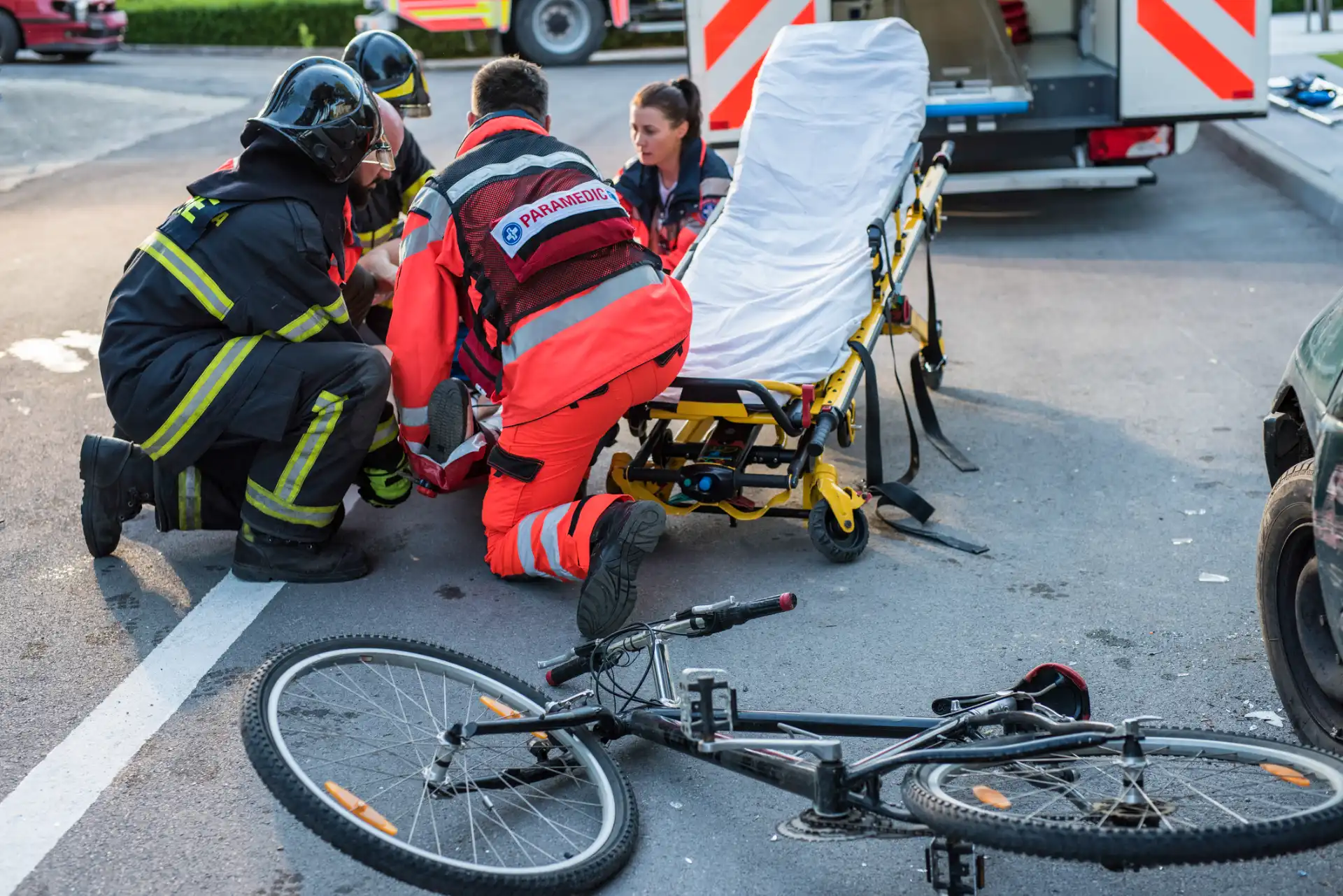Bicycle accidents can happen in an instant, and the aftermath can be overwhelming. Whether it’s a minor collision or a more serious crash, the first priority after a bicycle accident should always be your health and safety. While it might be tempting to brush off the need for medical help, even if you feel fine right after the accident, seeking medical attention is crucial for your well-being and for any future legal claims you may need to file. In this blog post, we will explore the reasons why getting medical help after a bicycle accident is so important.
1. Injuries Are Not Always Immediately Obvious
One of the biggest misconceptions about bicycle accidents is that you only need medical help if you can see visible injuries. Many people believe that if they’re not bleeding or bruised, they’re fine. However, the body can be significantly impacted by a crash, and some injuries may not manifest immediately.
-
Soft Tissue Injuries: Whiplash, muscle strains, and ligament sprains can be difficult to detect right after an accident. You might not feel pain immediately, but it can set in hours or days later.
-
Internal Injuries: Even if you don’t see cuts or bruises, you could be dealing with internal injuries like concussions, internal bleeding, or organ damage. These injuries can be life-threatening if left untreated.
-
Fractures or Bone Injuries: Small fractures, especially in the hands, wrists, or ribs, may not be immediately noticeable but can cause long-term pain and complications if not properly addressed.
Getting a medical evaluation ensures that any hidden injuries are diagnosed and treated as early as possible.
2. Establishing a Record of Your Injuries
If you plan to file a claim for compensation after the accident, having a medical record that clearly documents your injuries is essential. Insurance companies and courts rely on this documentation to determine the severity of your injuries and to assess how much compensation you should receive.
-
Medical Documentation: A report from a medical professional that outlines your injuries and treatment history strengthens your case and provides an accurate record of what happened during the accident.
-
Avoiding Complications in Your Claim: If you delay seeking medical help, the insurance company or opposing party may argue that your injuries weren’t serious or that they were caused by something other than the accident. Prompt medical attention protects your legal rights and helps prevent disputes over the cause or extent of your injuries.
3. Preventing Long-Term Health Problems
Some injuries may seem minor at first but can become much worse if left untreated. A small fracture can heal improperly, leading to long-term mobility issues. A concussion can result in persistent headaches, memory problems, or even permanent brain damage if not managed properly.
-
Chronic Pain: Injuries to the neck, back, or spine may not cause immediate pain but can develop into chronic conditions that require long-term care and rehabilitation.
-
Post-Traumatic Stress: Bicycle accidents, especially serious ones, can cause psychological trauma. Anxiety, depression, and post-traumatic stress disorder (PTSD) can set in after the accident. Seeking medical help helps identify and address these psychological effects early, ensuring you get the right support for a full recovery.
Early medical intervention allows healthcare professionals to detect and treat injuries before they turn into long-term problems.
4. Peace of Mind
Accidents can be terrifying, and the aftermath is often filled with confusion and stress. Even if you feel fine, a trip to the doctor can provide peace of mind that you are not dealing with any hidden injuries. It also allows you to discuss any concerns or symptoms you may have with a healthcare professional who can offer advice and reassurance.
-
Mental Health: Medical professionals can also help you process the emotional aftermath of an accident. If you’re feeling shaken, anxious, or depressed, mental health support from a doctor can guide you through coping strategies and therapeutic options.
-
Clear Understanding of Recovery: A doctor can outline a plan for recovery, helping you set realistic expectations and timelines for getting back to your normal routine.
5. Identifying Concussions and Head Injuries
Head injuries are one of the most dangerous consequences of a bicycle accident. Even if you were wearing a helmet, concussions and other head injuries can still occur. A concussion is a type of brain injury that may not always show visible signs but can lead to serious complications if untreated.
-
Symptoms to Watch For: Dizziness, nausea, confusion, blurred vision, or sensitivity to light are common symptoms of concussions. It’s important to report any of these symptoms to a healthcare provider, even if they seem mild.
-
Impact on Daily Life: Concussions and other brain injuries can affect your cognitive function, memory, and coordination. Addressing these injuries immediately is crucial for recovery and preventing long-term complications like chronic traumatic encephalopathy (CTE), a condition often associated with repeated head trauma.
6. Treatment for Scrapes, Cuts, and Road Rash
Even if you feel like you only have minor cuts and abrasions, it’s still essential to get proper medical care. Road rash and other surface-level injuries can become infected if not cleaned and treated properly.
-
Infection Prevention: Medical professionals can clean and dress wounds in a sterile environment, reducing the risk of infection. This is especially important if the wound is large, deep, or if dirt or debris from the road has entered the wound.
-
Proper Healing: A doctor can assess the injury and ensure it heals correctly, minimizing scarring and reducing the risk of complications in the future.
7. Legal Protection for Your Bicycle Accident Case
If you plan to pursue a personal injury claim after a bicycle accident, receiving medical attention right away is essential not only for your health but also for the legal process. A delay in seeking medical treatment could hurt your case and complicate matters when dealing with insurance companies or law enforcement.
-
Proof of Injury: A timely medical evaluation provides solid evidence of the severity and nature of your injuries. Delays in seeking treatment can make it harder to prove that the injuries were directly caused by the accident.
-
Strengthening Your Case: The sooner you see a doctor, the more likely it is that the treatment records will be linked directly to the accident, ensuring that your case is strong and credible.
8. How to Find the Right Medical Professional After a Bicycle Accident
After a bicycle accident, it’s essential to seek the right medical care. While any doctor can examine your injuries, a specialist, such as an orthopedic surgeon or neurologist, might be needed depending on the nature of your injuries.
-
Orthopedic Specialists: If you’ve suffered bone fractures or musculoskeletal injuries, an orthopedic specialist will be able to provide a more thorough examination and develop a treatment plan.
-
Neurologists: If you suspect a concussion or any form of brain injury, a neurologist can provide specialized care, including brain scans and cognitive tests.
Conclusion
After a bicycle accident, getting medical help is crucial for both your physical and legal recovery. Even if you feel fine in the moment, hidden injuries can worsen over time, leading to long-term consequences. Seeking medical attention ensures that your injuries are documented, treated, and properly managed, giving you the best chance for a full recovery. Whether it’s physical or emotional injuries, early medical intervention helps you take the first step toward healing and ensures that your legal rights are protected. Never underestimate the importance of medical help—your health and your future are worth it.




